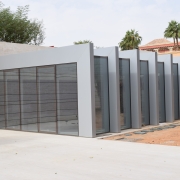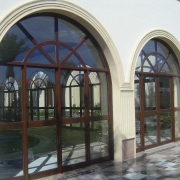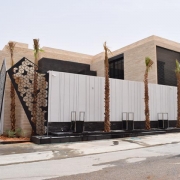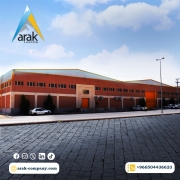Sustainability has become a core concept in modern times, driven by the increasing environmental challenges posed by urban and industrial expansion. In construction projects, metal materials play a vital role not only in providing strong and efficient structural solutions but also in achieving sustainability goals. Careful selection of metal materials based on sustainability principles reduces the environmental impact of projects and enhances their long-term efficiency.
In this article, we explore the importance of sustainability in selecting metal materials, their environmental and economic benefits, and how to incorporate sustainability throughout various construction phases.
What is Sustainability in Construction?
Sustainability refers to meeting current needs without compromising the ability of future generations to meet their own. In construction, it focuses on reducing the consumption of natural resources, minimizing harmful emissions, and promoting recycling and the use of reusable materials.
Why Are Metal Materials Important in Construction Projects?
Metal materials such as steel, aluminum, and copper are pivotal in construction due to their unique properties, including:
- Strength and Durability: Metals can withstand heavy loads and harsh weather conditions.
- Recyclability: Most metals are highly recyclable, reducing construction waste.
- Versatility: Metals are used in structural frameworks, facades, roofing, and other applications.
The Role of Sustainability in Selecting Metal Materials
- Reducing Carbon Emissions:
The production of metals like aluminum and steel generates significant carbon emissions. However, these impacts can be mitigated by using recycled metals or adopting low-carbon manufacturing techniques. - Extending Building Lifespan:
Sustainable metal materials are long-lasting, reducing the need for frequent maintenance or component replacement. - Improving Energy Efficiency:
Some metals, such as aluminum, are lightweight and offer excellent thermal insulation properties, lowering energy consumption in buildings. - Promoting a Circular Economy:
Recycling metals reduces the need for raw material extraction and minimizes waste generated during demolition.
Benefits of Using Sustainable Metal Materials in Construction
- Cost Savings Over Time:
Although initially more expensive, sustainable metal materials reduce long-term costs through lower maintenance and energy requirements. - Enhanced Environmental Performance:
Commitment to using sustainable metals boosts the project’s reputation and market appeal. - Compliance with Regulations:
Many countries enforce strict environmental laws, and using sustainable metals helps projects adhere to these regulations.
How to Integrate Sustainability in Metal Material Selection
- Using Recycled Metals:
Opt for recycled metals instead of raw materials, as they require less energy to produce. - Ensuring Source Verification:
Select suppliers who adhere to sustainable practices and use environmentally friendly production methods. - Smart Design Practices:
Design buildings to use minimal metal materials without compromising structural integrity or performance. - Regular Assessments:
Conduct periodic evaluations to ensure sustainability is maintained throughout the project lifecycle.
Examples of Sustainable Metals and Their Applications in Construction
- Aluminum:
A lightweight, corrosion-resistant, and 100% recyclable material used in facades, windows, and doors. - Stainless Steel:
Used in structural frameworks and applications requiring high corrosion resistance. - Copper:
Commonly utilized in plumbing systems and roofing due to its durability and weather resistance.
Challenges in Applying Sustainability to Metal Material Selection
- Initial Costs:
While offering long-term benefits, sustainable metal materials often come with higher upfront costs. - Lack of Awareness:
Many engineers and contractors lack sufficient knowledge about the advantages of using sustainable metal materials. - Availability Issues:
Finding suppliers offering high-quality, affordable sustainable metals can be challenging.
Solutions to Enhance Sustainability in Metal Usage for Construction
- Investing in Eco-Friendly Technologies:
Encourage companies to adopt technologies that reduce the environmental impact of metal production. - Education and Training:
Raise awareness among engineers and contractors about the benefits and importance of sustainability in selecting metal materials. - Government Incentives:
Provide tax breaks or incentives for companies that use sustainable materials in construction projects.
Sustainability as the Future of Modern Construction
Amid climate change and the growing emphasis on green buildings, sustainability is no longer optional. Choosing sustainable metal materials not only improves project efficiency but also demonstrates a commitment to environmental and social responsibility.
Sustainability in selecting metal materials for construction projects is essential for balancing present needs with future requirements. Using sustainable metals and innovative manufacturing techniques can enhance the environmental and economic performance of projects. Furthermore, incorporating sustainability at every stage of construction enhances project reputations and sets a benchmark for the industry.












Leave a Reply
Want to join the discussion?Feel free to contribute!